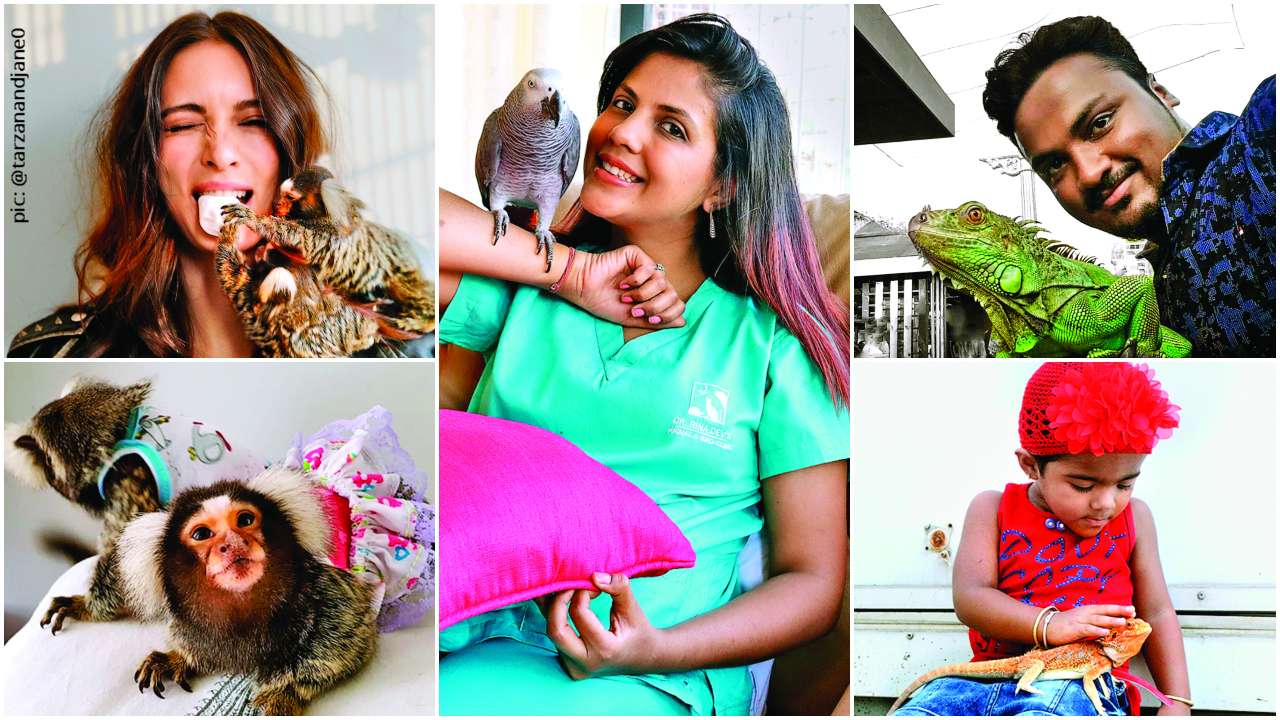
As you walk into the two bedroom apartment of Vijay AR in Chennai, you see his four-year-old daughter Laya busy at play with their pet iguana Iggy, from the green iguana family. Though they’re the same age, Iggy has already grown to her full adult size, which is five and a half feet.
But Laya stands fearless of the dinosaur-looking lizard and happily feeds her greens and fruits from the palm of her hand while Iggy’s better half Spikey, who has colour mutations to look red, scurries off to the kitchen. Not only does the pair run about, unrestricted, inside the house, but they also have their own enclosure in Vijay’s adjoining exotic pet dealership – Tamed Pets.
During his pre-teen years, Vijay became fascinated with animals and then grew to love reptiles altogether, which is why this former HR personnel’s retirement plan is to be surrounded by iguanas, bearded dragons, snakes and macaws found at his pet shop. “We have two pairs of iguanas that lay nearly 50 eggs (combined) every year. We then give them to government-owned zoos and parks as well as those who want them as pets,” he says. But he is a stickler for inspecting the new pet owners to see if they are capable of taking care of these wondrous creatures. “If you don’t have that much time, you should go in for a pet hamster or a guinea pig. But these big beautiful iguanas live for a very long time,” says the 33-year-old, adding, “they can live up to 15 years.” The best time to get an iguana, he says, is when they’re three and a half months old because that’s when they are self-fed and have fewer health complications. Being herbivorous, the iguanas’ diet consists of green leafy vegetables and fruits.
Up in the posh Bandra residences of Mumbai, Dr Rina Dev dresses to go out on the town. But as she readies to leave, a feathery bod appears and calls in a nasal voice, “Mama going out?” For Dev, the people who coined the term ‘bird brain’, have got it all wrong. “My seven-year-old African grey parrot has the intelligence of a five-year-old child,” says Dev, adding, “I have patients whose birds use Alexa to call people or even play music.” Kamaki, as Dev’s pet is aptly called – which is Casanova in Greek – can mimic the sound of dogs and cats as well. But as most of Mumbai looks into owning the African grey parrot, Dev advises, “these birds need a lot of mental stimulation.
Within a year, clients come back saying the bird is losing his feathers. It’s never an infection, but the lack of stimulation because they’re kept in a cage all day. These birds then start excessively grooming themselves.”
Seeing as how 80 per cent of the clientele of her Animal and Bird Clinic in Mumbai own exotic pets, Dev says, “There is a growing market for exotic animals in India.” She is also quick to warn about indulging in illegal trade, checking up on the breeder of the animal and not buying these birds only as status symbols. The best time to get the African grey parrot, she advises, is before three months when they’re just switching between hand feeding bird formula. “The best way to bond with animals is over food so that they associate you with something good.” Their diet then consists of a variety of vegetables, fruits, nuts and protein like fish, chicken and eggs.
Cute things might come in small packages but these marmosets or pocket monkeys – that are no bigger than the palm of one’s hand (tail included) – need a lot of space to run around. “Tarzan and Jane have their own room,” says Suren Joshi, restaurateur and gym owner. But this animal lover warns not to expect any of the usual monkey business from this lot, “it’s always best to get them in pairs for they need company.”
This dynamic duo is also an expensive bunch, who need a watchful eye all through the day. “I paid almost Rs 2 lakh to get them. Plus you have to feed them exotic worms, crickets and ready-made marmoset food imported from Thailand (which he gets from a supplier in Bengaluru), as they require a lot of [vitamin] D3.” But they also eat rice, bananas and boiled chicken and vegetables.
While Tarzan pouts and squints to assert dominance, he is also very protective of Jane, who is friendlier and likes to play with their pet Saint Bernard. “They’re a vocal bunch and they will do what they want. They will slap and bite you or pull your hair,” Joshi laughs, adding that they have their own way of showing affection.